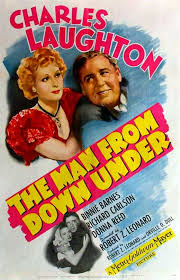
THE MAN FROM DOWN UNDER
US, 1943, 103 minutes, Black and white.
Charles Laughton, Binnie Barnes, Richard Carlson, Donna Reed, Horace Mc Nally, Arthur Shields.
Directed by Robert Z. Leonard.
The Man from Down Under indicates an Australian. And this time he is played by Charles Laughton. The film is rather oddball, especially frustrating audiences, listening to the variety of English-derived accents, some with a little American twang. However, there is plenty of Australian slang, some at times overloading the dialogue.
The film is part of the MGM war effort, a story about Australian allies, respect for their contribution to the war effort, especially after the bombing of Pearl Harbor and the bombing of Darwin and northern Australia. The film was released, more or less, at the time of the Battle of Guadalcanal.
The film opens with World War I, the Australians going home, pretty noisy and drinking in France, Jocko Wilson, Charles Laughton, about to return but involving himself with some of the children, some orphans, and agreeing to smuggle them back to Australia. The Australian action takes place in the 1920s and 30s, especially in a Melbourne pub, Jocko training Nipper (Richard Carlson) who becomes a significant boxer, competing for the Empire title. In the meantime, the other orphan, Mary (Donna Reed) has been away at boarding school and returns just at the time of the fight.
The film has a rather unusual subtext for the period, potential incest, the two orphans considered brother and sister, although the audience knows from the outset that in fact they are not blood relations. But this causes a lot of tension, Mary courted by a journalist, Horace Mc Nally, and Nipper realising his feelings for his sister.
The film has an unexpected Catholic tone, the sequence in France where the friend of the father of the orphans gives the abbe some relics for the children. He is very sympathetic as he runs the orphanage. In Australia, there is a rather large ecclesiastical establishment near the hotel in North Queensland, with the clerics in soutanes, which looks something like a seminary. One of the priests, Father Polycarp (Arthur Shields, brother of Barry FitzGerald?, who also appeared as a priest in Scandal at Scourie) is a friend at the hotel, is able to massage for Nipper and his injured shoulder, but also as a confidant, and the spiritual guide for Nipper in his personal worries. It is Father Polycarp who, at the end, provides the information that they are not brother and sister.
Also in the cast is Binnie Barnes as a club dancer who is stood up by Jocko at the church but who comes to Australia in disguise, twice widowed, who has sold the hotel to Jocko but gets it back because of his constant gambling and IOUs.
The film was directed by Robert Z Leonard, a veteran of many MGM films, including Pride and Prejudice.
1. The film of the MGM war effort? An entertainment? Propaganda? Against the Japanese?
2. The film in production soon after the attack on Pearl Harbor? The bombing attacks on Australia? Drawing on this history? The use of newsreel footage?
3. The American tribute to the Australian war effort, Australia as ally of the United States?
4. The French World War I settings, the transition to Australia, the city, in the pub, to North Queensland, the countryside, the hotel? The musical score?
5. An American version of Australia? Australian characters? The variable accents? The slang and Australian phrases? Credible for the world audience?
For Australian audiences?
6. The title, the emphasis for Australia?
7. France, the end of World War I, troops going home, the Australians, rowdy, Jocko in the group, his leadership, with the orphans, the children fighting, boxing, his liking the two children, their reliance on him, arranging for Ginger to smuggle them onto the boat?
8. Jocko and Aggie, the singing, the past, tough, confronting Jocko, his proposal, the money for the trousseau, calling it torso, his being picked up for rowdiness, Aggie waiting at the church, his going on board, behind bars?
9. Jocko in Australia, with Ginger, buying the pub, the clientele, rowdy, boxing? His training Nipper, Nipper growing up, his fighting skills, the build-up to the Empire championship? Everybody betting, for and against? Jocko and the risks?
10. Mary, returning from boarding school, growing up? The family reunion? At the station, the meeting Dusty, the attraction, the attraction to Nipper?
11. The fight, Nipper and his perseverance, winning? Rejoicing? Yet Nipper, the damage to his shoulder? His shruggin it off? Jocko knowing the truth?
12. The decision to buy the hotel, setting up the resort, North Queensland? No guests? The arrival of Aggie, her assistant, being a widow, having bought the hotel? The attraction to Jocko, getting revenge, the card games, his IOUs, her finally taking over? His staying as manager?
13. Life at the resort, Ginger and his work? Father Polycarp? Genial presence, wise advice? The neighbouring seminary?
14. Dusty and his visit, attraction to Mary, the proposal, The fighting him? His later apology? Going to the monastery, talking with Father Polycarp? His attraction towards Mary? Feeling that he should have to go away, no explanations? Jocko thinking he was a coward?
15. The war, the attack on North Queensland, Jocko and Ginger signing up, Jocko and the rejection, his doing labouring work? Finally arriving back in North Queensland? His wanting to get to the hotel, the crash and finding, freeing him?
16. The women, the war effort, nursing, the children, having to evacuate? The clerics helping? The Japanese crash? The soldiers escaping, threatening, Jocko and their fighting them?
17. Father Polycarp, the news of the background of the two children, Mary and her dream with Nipper absent, the documents, the medals given by the friend to the day in France?
18. Jocko and Aggie, Ginger and his work, Mary and Nipper together?
19. A different kind of war effort film?